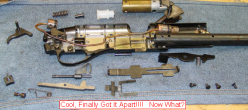
I met up with Tim McMurray of Mac1 Airgun Shop on Thursday, and we were talking about his new series of rebuild kits for vintage airguns. I asked him how he decided which airgun to develop a kit for. First, he said, it has to be worth rebuilding, like many of the airguns from Crosman’s Golden Age (1950’s to mid-1970’s). He went on to describe that as Crosman’s 1st golden age, and noted that we are in the second one right now.
From the perspective of a shooter and tinkerer, one characteristic of the 1st ‘golden age’ is the influence of mechanical engineers, designers and marketing people on the final product. Starting in the 1950;s, we had Rudy Merz developing all kinds of innovative Co2 and pneumatic designs, including the Crosman 140/1400 auto cockers and the stunning cycling mechanism of the 600 repeating pistol. Then, as Crosman was absorbed by Coleman, followed by others, it seemed that the lawyers gained unwarranted input into the design process, and marketing was based more on what the accountants thought best to make, rather than what customers wanted based on market research. This is not a criticism of Crosman in particular, as it seemed to be a general trend in American industry.
Well, it’s pretty clear now that Crosman is back.
We have evidence from the Marauder line of Benjamin branded rifles and pistols, which provide for about as much adjustment and individuality as there are individual airgunners. And all in a relatively simple and affordable package. That line has been improved in 2014 with the generation II Marauders, which can be had in an ergonomically improved stock, either synthetic or wood, and have an upgraded baffle system to make the gun quieter. Crosman also claims the new Marauders get more shots and have more power, although I didn’t get specifics as to how that was achieved.
And in keeping with the idea of innovating and improving on a popular design, Crosman introduced a new break barrel rifle that incorporates the new Nitro Piston II technology. If the production guns can come even close to the one I shot at Media Day at the Range, this new technology and airgun line is going to be a winner.
For one thing, it was easy to cock, unlike the major muscle required for previous generations of nitro piston rifles. The trigger was not noticeable, which is an improvement, and has been upgraded from the prior nitro piston version to a true 2 stage, adjustable trigger. Recoil was not particularly harsh, really hardly noticed it. And I was able to hit what I was aiming at through the 3×9 Centerpoint scope.
I won’t go into detail here on the Nitro Piston II technology, as I’ve already covered it in another post. But in this ‘year of the gas ram’, when every break barrel airgun maker seemingly has a new or improved gas ram product, it’s encouraging to see Crosman out in front of the parade with what looks like a great product.
And I particularly like how Crosman brought out the mechanical engineers and industrial designers to the SHOT Show. Got a technical question on a particular airgun? Here’s the guy that designed it. Ask him. Plus the technical guys were brought into meetings with the volume buyers, further emphasizing the focus on the tech side of things. And I would include the marketing people too, since they are the ones who try to figure out what customers want. Like better triggers, quieter shooting, easier cocking, etc.
Of course, a short memory helps. And innovation by itself doesn’t always lead to successful products. But better to try a Rogue and miss, than not try at all.
The sad news, of course, is that the Sheridan multi-pump .20 cal rifle is no longer being produced. I was told that it hadn’t been discountinued, but that they just aren’t making any more because of low demand. And the Benjamin pumpers may not be far behind, especially the 397, the .177 cal version. I guess as a kind of response, Crosman did make some changes to the Pumpmaster 760 which are supposed to make it easier to pump. So pumpers are not completely on the way out.
One last note; Crosman made a big deal of the guns that are ‘built in America’. This is different than ‘made in America’, which would imply that the majority of the components are also made here. To remain competitive at a price point, we would expect many airgun components to be made overseas. Nevertheless, with some parts made in the US, and assembly at the New York plant, ‘built in America’ is still a step in the right direction.
I took some video to give a brief overview of the Crosman exhibit, here;
You can find more information about Crosman at their web site here;
www.crosman.com










































